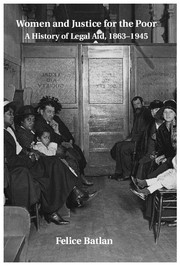Book contents
- Frontmatter
- Contents
- List of Plates
- Acknowledgments
- Abbreviations of Primary Organizations
- Introduction
- PART I A FEMALE DOMINION OF LEGAL AID, 1863–1910
- 1 The Origins of Legal Aid
- 2 The Chicago Experience: The Maturation of Women's Legal Aid
- PART II THE PROFESSIONALIZATION OF LEGAL AID, 1890–1921
- PART III DIALOGUES: LAWYERS AND SOCIAL WORKERS, 1921–1945
- Conclusion
- Index
- Plate Section
2 - The Chicago Experience: The Maturation of Women's Legal Aid
from PART I - A FEMALE DOMINION OF LEGAL AID, 1863–1910
Published online by Cambridge University Press: 05 May 2015
- Frontmatter
- Contents
- List of Plates
- Acknowledgments
- Abbreviations of Primary Organizations
- Introduction
- PART I A FEMALE DOMINION OF LEGAL AID, 1863–1910
- 1 The Origins of Legal Aid
- 2 The Chicago Experience: The Maturation of Women's Legal Aid
- PART II THE PROFESSIONALIZATION OF LEGAL AID, 1890–1921
- PART III DIALOGUES: LAWYERS AND SOCIAL WORKERS, 1921–1945
- Conclusion
- Index
- Plate Section
Summary
Women's dominion of legal aid came to full fruition with the founding of Chicago's Protective Agency for Women and Children (PAWC) in 1885. The agency provided legal and nonlegal services to poor and working-class women. Its leaders saw women's exploitation as arising from the distinct but connected realms of the home, the marketplace, and the state. Aiding poor women was crucial to the agency's mission, but a corollary was that its leaders often held poor, working-class, and immigrant men responsible for much of the harm that poor women experienced. They further understood that such male behavior called for intervention on the part of elite white women. Owing to their members' gender, class standing, and cultural capital, the agency was able to get its foot in the door of Chicago's municipal legal institutions. Over time, the agency's power grew as it accumulated substantial experience and legal knowledge. Many of its ideas and practices would be incorporated by later legal aid organizations and would be institutionally formalized when Chicago created its juvenile and domestic relations courts.
The Chicago Women's Club
The Protective Agency for Women and Children began without fanfare, growing out of the Chicago Women's Club (CWC). Caroline M. Brown, a wealthy woman and the mother of two children, founded the club in 1876 when she invited twenty-one women to meet in her living room to learn about and discuss the' pressing social, political, and cultural issues of the day. Brown was acutely aware of the limited sphere in which respectable women could maneuver and worried that some might take a dim view of the club. In the aftermath of the disastrous Chicago fire in 1872, however, the city was a particularly hospitable place for such a group. Women had created organizations to provide charity and relief to victims of the fire, thus starting the tradition of women's organizing in Chicago. Without quite knowing it, Brown began articulating the rationale for what would come to be known as “municipal housekeeping,” the idea that women's roles as mothers and housewives required them to be knowledgeable about and involved in issues affecting the home and children that, as the nineteenth century progressed, involved an ever-widening swath of activity.
- Type
- Chapter
- Information
- Women and Justice for the PoorA History of Legal Aid, 1863–1945, pp. 47 - 84Publisher: Cambridge University PressPrint publication year: 2015



